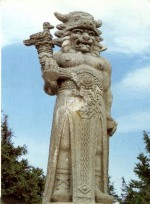
Radgost was the supreme deity of the Slavic town of Retre or Radgosc (from where his name derives).
In Radgošć or Retre there was a temple of this deity made of wood, beautifully painted inside and outside. Adam Bremensk describes the statue of Radgost which was located in the temple as a magnificent golden structure on a purple platform. The statue was probably made of wood, as other statues of Slavic gods.
In front of the Radgost temple trade was made, while inside the temple – divine rites. The rite was practiced as follows: first the priests were digging holes in the ground, then interpreted the shapes of the grooves, and then let out the "green horse" inside the temple.
This horse was a normal horse, which, for the purposes of divination, was covered with grass. Depending on where the horse would trample, it would have been interpreted as the will of the gods. The temple of Radgost was built in 1000 and burned in 1066 by Catholics.
Radgost, as well as some of the Slavic gods, was represented by several heads. One was human, and the other of a lion. The lion's head showed the age of the gods knowing that the lions were gone from the Slavic territory, already in the period of Alexander the Great. Like any other gods, Radgost was portrayed as a warrior. In one hand he held the axe while in another - bread and salt. What does it mean? Bread and salt are symbols of hospitality in the Slavic countries, so it can be concluded that Radgost was the god of hospitality.
And his name confirms - Radgost, a dear guest that is the guest whom the host welcomes.
It should be noted that the Slavic people are very hospitable to their guests, they always give food or a place to sleep and in some cases the host offers guests even his wife. (This practice also existed among the Scandinavian people). The Slavs have always been good hosts and this virtue of the Slavs was reflected during the holy day of the family - a festival dedicated to the Christian saint, the patron of the family. During this day the host did his best to please his guests. The axe of Radgost was a symbol of hospitality - it was a weapon of the host to use in case of an attack to protect the guests. In addition to being the god of hospitality, Radgost was the god of happiness. He was connected to the wine and celebrated by the winemakers. For these reasons Radgost was dedicated to the time of year when the holidays of the Slavs are the most frequent. Even today, the period of the Slavic holidays is winter.
READ ALSO:
Dazbog was the god of fire, sun and rain
Perun is the god of the sky and thunder
Vesna was the goddess of spring
Horz is associated with the Moon
Stribog is the god of the wind








